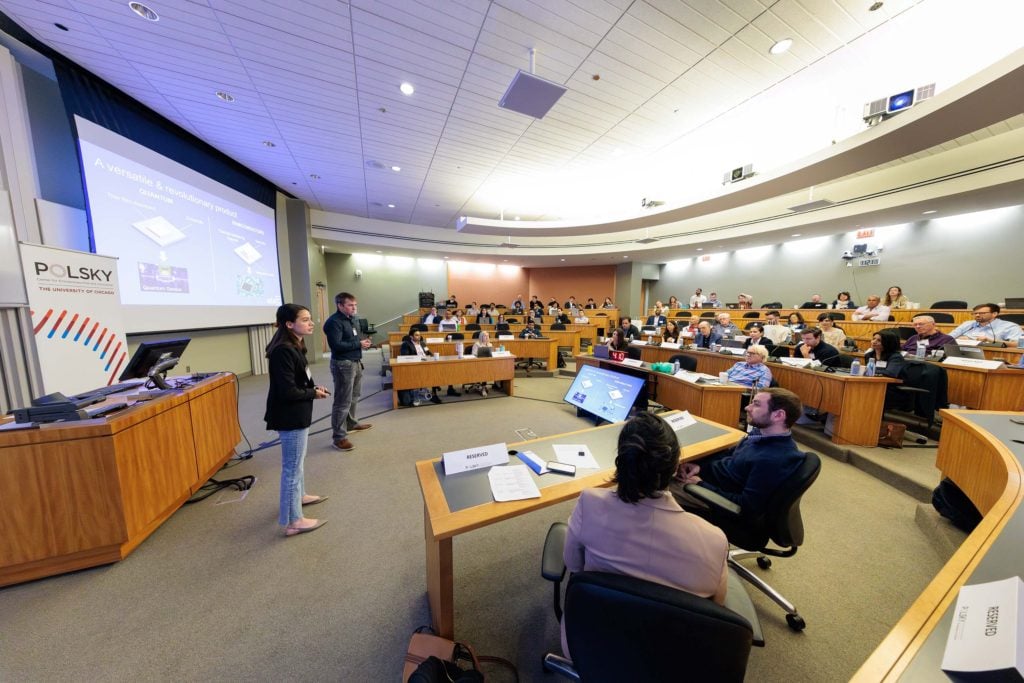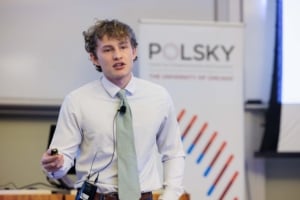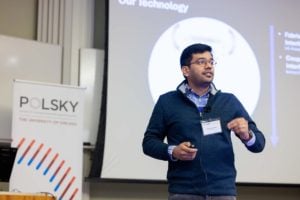Three UChicago Startups Receive Investment from the George Shultz Innovation Fund

StaC12 presents at the George Shultz Innovation Fund finals.
The finalists pitched to the Innovation Fund Advisory Committee, which consists of advisors, entrepreneurs, and industry experts, on May 29.
The George Shultz Innovation Fund has awarded $250,000 to StaC12, $200,000 to Theta Neurotech, and $150,000 to CavilinQ to support the continued development and commercialization of their technologies.
Managed by the Polsky Center for Entrepreneurship and Innovation, the George Shultz Innovation Fund provides up to $250,000 in funding for early-stage tech ventures emerging from the University of Chicago, Argonne National Laboratory, Fermilab, and the Marine Biological Laboratory.
“Since moving to a single funding cycle per year, we received one of the highest numbers of applications ever for the George Shultz Innovation Fund,” said Shyama Majumdar, director of Science Accelerators and Investments at the Polsky Center. “The quality of submissions was exceptional, making it a challenge to select just four finalists. This year’s three awardees span material science, quantum computing, and medical devices — demonstrating the breadth and excellence of research emerging from the University of Chicago. As venture capital becomes increasingly difficult to secure, early-stage risk capital like the Innovation Fund plays a critical role in advancing university spinouts. Congratulations to our awardees—I’m excited to see the remarkable heights they will undoubtedly reach.”
This year’s investments include:
// StaC12 ($250,000) Cofounded by Alex High, assistant professor of molecular engineering at the Pritzker School of Molecular Engineering, and led by CEO Avery Linder, StaC12 is building an integrated diamond platform that enables the practical adoption of diamond in semiconductor and quantum applications. The startup’s thin-film single-crystal diamond is bonded to materials such as silicon, sapphire, and fused silica, unlocking new possibilities for next-generation devices.
“We are thrilled to be recognized by the George Shultz Innovation Fund,” said High. “The prestige of the award significantly improves the visibility of our company and our viability in the eyes of future investors. We are also grateful for the due diligence process and the opportunity to work with so many talented people at Polsky – this process has helped us clarify our vision and focus as a company and been invaluable to our growth.”
“As we go forward, these funds will enable us to rapidly accelerate the development of our thin-film diamond manufacturing facility,” he added.
“We are building a platform to enable the next generation of technologies that will shape the world around us and improve lives,” said Linder. “This award supports our efforts to meet today’s demand while accelerating our momentum toward that future. We are honored and excited to strengthen our relationship with the University of Chicago and to continue building meaningful impact.”

Truman Pierson, founder and CEO, Theta Neurotech
// Theta Neurotech ($200,000) Cofounded by Truman Pierson, founder and CEO, and alum of UChicago’s College,Theta Neurotech is developing a near-invisible EEG patch that predicts and alerts patients of epileptic seizures before they occur. Using a proprietary machine learning model trained on an extensive internal data corpus, the company is building a seizure prediction system to provide patients with advanced notice of seizures and reduce the unpredictability of their condition.
“Theta Neurotech is grateful for the support provided by the George Shultz Innovation Fund,” said Pierson. “The provided capital will allow us to scale our machine learning models with a large data corpus we have built internally. It will also contribute to the remaining R&D of our EEG patch, enabling a prospective study of our seizure prediction system.”
“Multiple millions of Americans are struggling with seizures that strike without warning. This capital decreases the time-to-solution for these patients,” he added.
// CavilinQ ($150,000) Founded by Shankar Menon, graduate student at the Pritzker School of Molecular Engineering, CavilinQ is developing a scalable quantum computing architecture based on precisely controlled arrays of neutral atoms interconnected via optical cavities. This modular approach aims to overcome key technical barriers in scaling quantum computing systems for both industry and academic research.

Shankar Menon, founder of CavilinQ
“CavilinQ is honored and excited to be recognized by the George Shultz Innovation Fund. This support comes at a critical time as we work to scale our platform for modular quantum computation. The funding will help us advance our technical milestones, deepen our IP strategy, and engage early partners in both industry and academia as we move toward commercialization,” said Menon.
“We appreciate the Polsky Center’s commitment to transforming cutting-edge research into impactful ventures — this support is instrumental in helping us turn our quantum interconnect technology into a scalable product that can power the next generation of quantum computing,” he added.
To date, the Innovation Fund has invested in more than 90 companies. Notable companies launched with the fund’s support include ExplORer Surgical, acquired by Global Healthcare Exchange; Super.Tech, acquired by ColdQuanta; OrisDx, which won the 2022 New Venture Challenge and recently and closed a $4 million seed round; Flow Medical, which recently secured $5 million in seed funding; and Alnair Therapeutics, which closed an oversubscribed $1+ million pre-seed funding round.
The core mission of the Innovation Fund is to help scientific founders turn their innovations into ventures that advance cutting-edge technologies, generate significant financial returns, and create lasting impact for humankind.